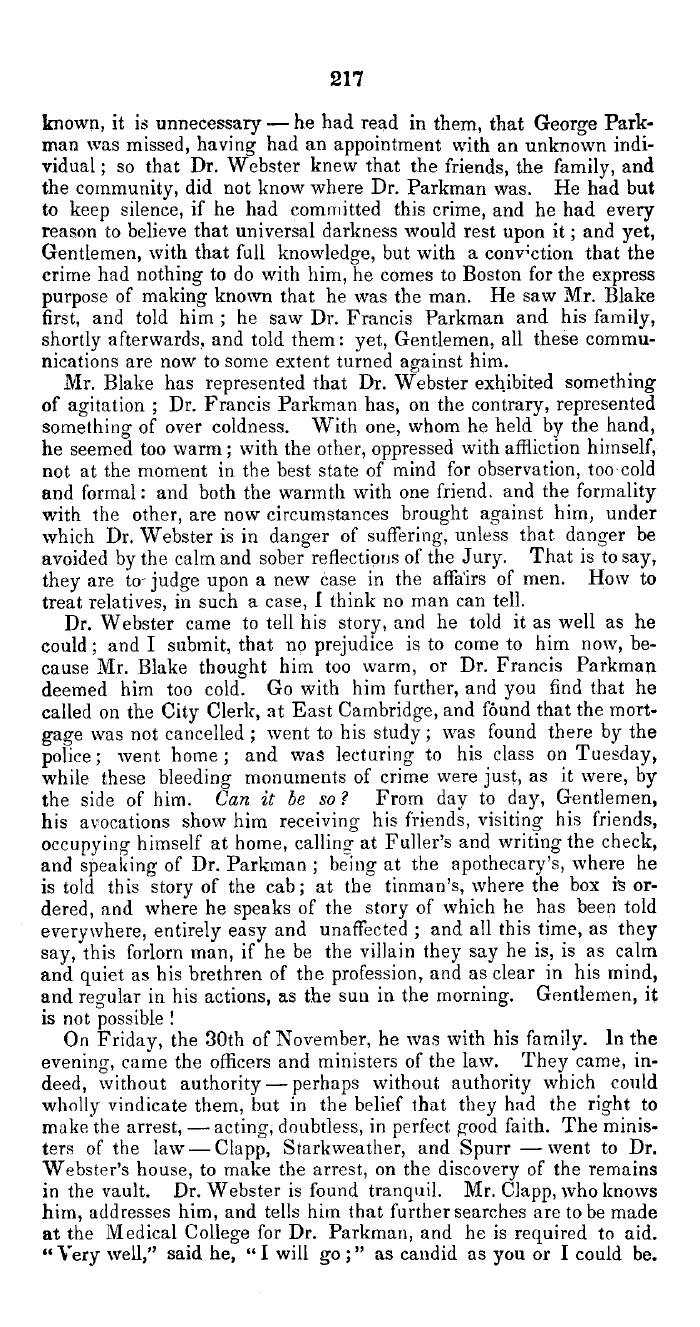|
217
known, it is unnecessary - he had read in them, that George Park-
man was missed, having had an appointment with an unknown indi-
vidual; so that Dr. Webster knew that the friends, the family, and
the community, did not know where Dr. Parkman was. He had but
to keep silence, if he had committed this crime, and he had every
reason to believe that universal darkness would rest upon it ; and yet,
Gentlemen, with that full knowledge, but with a conv•ction that the
crime had nothing to do with him, he comes to Boston for the express
purpose of making known that he was the man. He saw Mr. Blake
first, and told him ; he saw Dr. Francis Parkman and his family,
shortly afterwards, and told them: yet, Gentlemen, all these commu-
nications are now to some extent turned against him.
Mr. Blake has represented that Dr. Webster exhibited something
of agitation ; Dr. Francis Parkman has, on the contrary, represented
something of over coldness. With one, whom he held by the hand,
he seemed too warm; with the other, oppressed with affliction himself,
not at the moment in the best state of mind for observation, too cold
and formal: and both the warmth with one friend, and the formality
with the other, are now circumstances brought against him, under
which Dr. Webster is in danger of suffering, unless that, danger be
avoided by the calm and sober reflections of the Jury. That is to say,
they are to- judge upon a new case in the affairs of men. How to
treat relatives, in such a case, I think no man can tell.
Dr. Webster came to tell his story, and he told it as well as he
could ; and I submit, that no prejudice is to come to him now, be-
cause Mr. Blake thought him too warm, or Dr. Francis Parkman
deemed him too cold. Go with him further, and you find that he
called on the City Clerk, at East Cambridge, and found that the mort-
gage was not cancelled; went to his study; was found there by the
police; went home ; and was lecturing to his class on Tuesday,
while these bleeding monuments of crime were just, as it were, by
the side of him. Can it be so? From day to day, Gentlemen,
his avocations show him receiving his friends, visiting his friends,
occupying himself at home, calling at Fuller's and writing the check,
and speaking of Dr. Parkman ; being at the apothecary's, where he
is told this story of the cab; at the tinman's, where the box is or-
dered, and where he speaks of the story of which he has been told
everywhere, entirely easy and unaffected ; and all this time, as they
say, this forlorn man, if he be the villain they say he is, is as calm
and quiet as his brethren of the profession, and as clear in his mind,
and regular in his actions, as the sun in the morning. Gentlemen, it
is not possible!
On Friday, the 30th of November, he was with his family. In the
evening, came the officers and ministers of the law. They came, in-
deed, without authority-perhaps without authority which could
wholly vindicate them, but in the belief that they had the right to
make the arrest, - acting, doubtless, in perfect, good faith. The minis-
ters of the law -Clapp, Starkweather, and Spurr -went to Dr.
Webster's house, to make the arrest, on the discovery of the remains
in the vault. Dr. Webster is found tranquil. Mr. Clapp, who knows
him, addresses him, and tells him that further searches are to be made
at the Medical College for Dr. Parkman, and he is required to aid.
'° Very well," said he, °' I will go;" as candid as you or I could be.
|

